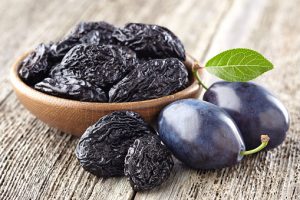 A rose by any other name is a rose. But the same does not hold true for a plum. Or a dried plum, to be more precise. For years, dried plums have been called prunes. And for the longest time, prunes have been associated with relieving constipation. Because of this one big benefit, prunes have gotten themselves into a bit of a stink. Young people especially don’t want to have anything to do with them, as they think it’s a “senior food.” In fact, women aged 25 to 54 react so negatively to the idea of prunes that the California Prune Board lobbied strongly to get the FDA to change “prunes” to the more appealing name, “dried plums” (which they technically are).
A rose by any other name is a rose. But the same does not hold true for a plum. Or a dried plum, to be more precise. For years, dried plums have been called prunes. And for the longest time, prunes have been associated with relieving constipation. Because of this one big benefit, prunes have gotten themselves into a bit of a stink. Young people especially don’t want to have anything to do with them, as they think it’s a “senior food.” In fact, women aged 25 to 54 react so negatively to the idea of prunes that the California Prune Board lobbied strongly to get the FDA to change “prunes” to the more appealing name, “dried plums” (which they technically are).
Guess what? The name change is working. At least for now. Sales of this super-healthy purple fruit have gone up. (Your tiredness is not just because of aging.)
Advertisement
And it’s a good thing too. Because while the three main components of prunes—fiber, sorbitol (a sugar alcohol that can loosen the stool), and a natural laxative compound called diphenyl isatin—no doubt help in relieving constipation, there are a lot of other health benefits to these delicious gummy-like fruits that offer a sweet fix for only 30 calories.
Prunes and heart health
While prunes and plums contain high levels of phytonutrients, we’ll focus on two specific ones—neochlorogenic and chlorogenic acid—that have a special affinity for cardiovascular health. Many studies show that these phytonutrients inhibit oxidation of lipid molecules in the body, helping prevent cellular damage. Since all of our cell membranes, as well as our brain cells, are largely made up of lipids, these are important phytonutrients to have in the diet. They also inhibit the oxidation of LDL cholesterol in the body, making them an important factor in the prevention of chronic diseases.
Type 2 diabetes, obesity, and prunes
Fiber is one of the most important components of any diet. Soluble fiber slows the rate at which food leaves the stomach and, as a result, delays the absorption of sugar into the bloodstream. As prunes and plums are rich in soluble fiber, they can play an important role in stabilizing blood sugar levels. Soluble fiber also increases the body’s sensitivity to insulin. And, yes, the fiber in prunes helps you feel satisfied after a meal. This is very crucial, as it helps prevent overeating. (Your declining stamina and increasing tiredness could be a sign that something is going horribly wrong on the inside.)
Cholesterol concerns? Take the prune way out
There are still more benefits to soluble fiber. It soaks up excess bile in the intestine and then excretes it. As bile is made from cholesterol in the liver, when bile is excreted along with the fiber from prunes, the liver needs to make more bile, and for this, it uses more cholesterol from the body, thus lowering the level of circulating cholesterol.
Lose your hatred for prunes and gain some bone
Advertisement
A study from 2011 showed that prunes and plums are the most effective fruit for preventing and reversing bone loss. The researchers believe this could be because of the high content of phenolic and flavonoid compounds in plums and prunes.
Prunes and the “feel-good” factor
Prunes are a rich source of beta-carotene. A 2013 study showed that an increased intake of beta-carotene can actually make people happier. And if a healthy dose of happiness is not enough, you also get a good boost of vitamin K, which works in conjunction with beta-carotene to fight the signs of aging. Another great reason to feel happy.
There you go. It’s healthy all around. So whether you call them dried plums or prunes, make sure you eat this amazing fruit.
